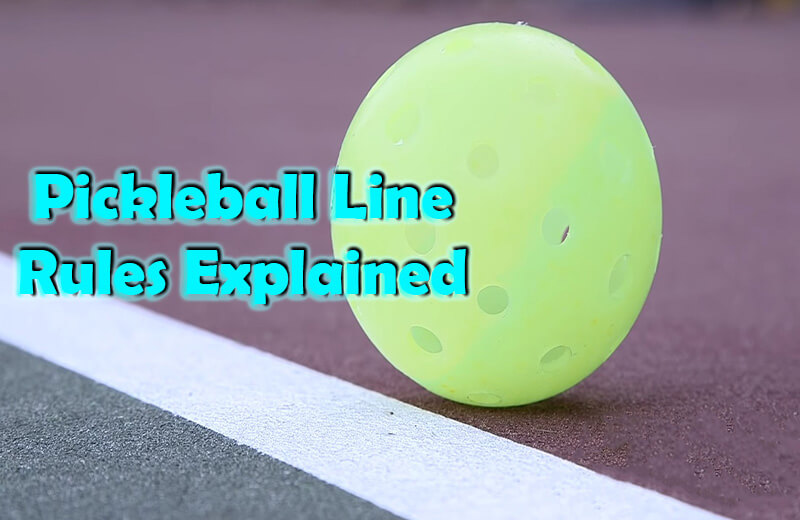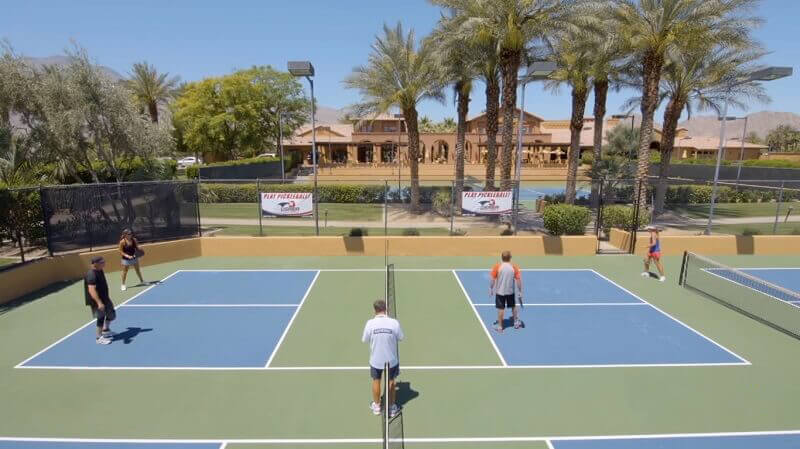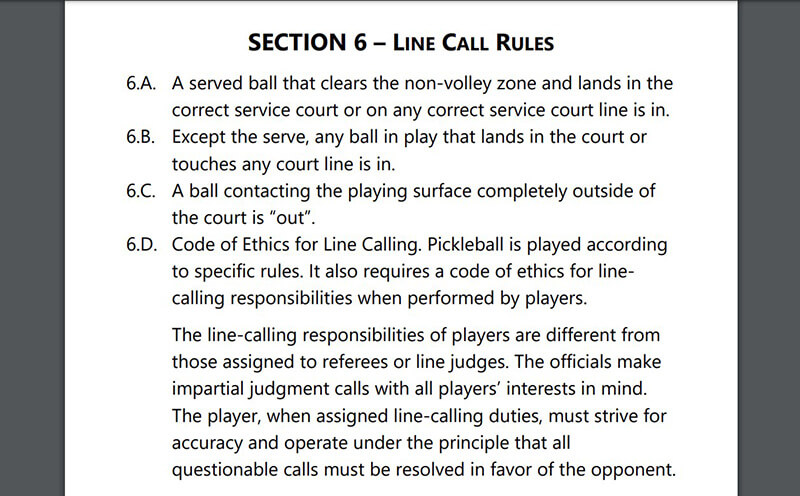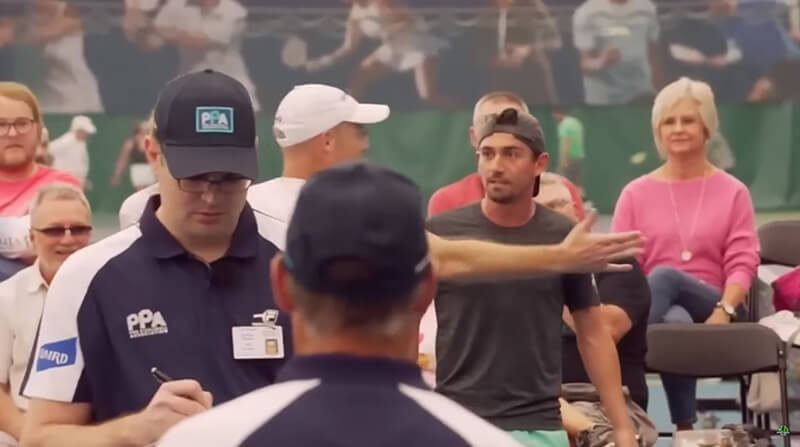Try To Understand the Basic Line Call Rules First
In general, the pickleball rules about declaring ball in or out differ slightly between service shots and regular shots.
In service, when you shoot the ball, make sure the ball goes into the opponent’s zone “outside” the non-volley zone and also includes the line. This means that the lines that are permitted as a place for the ball to land are the sideline, centerline, and baseline. In other words, the ball will be considered out if the pickleball serve hits the kitchen line and the entire area outside the paint of the line.
Read more: “The Complete Guide to Pickleball Serving Rules”
Meanwhile, in an ordinary shot, the ball will be considered in if it falls inside the court area, including on the kitchen line, baseline, or centerline. So, in other words, lines are the “marker” that the area that counts as a pickleball field ends, and you are not allowed to shoot over the paint line.
If the ball goes in then the rally will continue and if the ball goes out then the player is deemed to have made a mistake and that means ending the rally. The problem is when the ball makes contact with the ground, our vision is often blurry. We might think our shot went in and the opponent thought it was out or vice versa.
Maybe it would be very convenient if our pickleball court had an electronic device for replaying the trajectory and the point of contact of the ball like in tennis. But what we will discuss is if we play without using a device.
Who Has the Right to Make Line Calls in Pickleball?
Line calls in Racket Sports such as pickleball, tennis, and badminton are very important. Because the ball that falls into any area will generate points and provide an advantage for the player.
Line Calls in pickleball can be made under several conditions. If there are no referees or line judges, then line calls are the responsibility of the players in their respective areas of the field. In addition, pickleball players may call foot faults in the non-volley zone. This also applies to doubles games where your partner can also serve calls from his side of play.
If your game has an umpire, then he has the right to rule on short serves, foot faults, and all things in the non-volley zone. Note that line calls are still the responsibility of the players.
Confusing about Faults? Here is Simple Explaination: “What is a fault in pickleball“
Lastly, if in a complete game, there are referees and linemen, then almost all line and service rules are their responsibility. Players are only entitled to make calls on the halfway line. In other words, all calls will be considered invalid unless proven to be detrimental to the player.
If in a game of pickleball without a line judge, when a player makes the first line call but is in doubt, he can ask the view of the opponent or the referee. If the referee and opponent have a clearer view, this clearer view shall be used. If this clear view also doesn’t work, then the initial call that was made will be used as the final decision.
Line calls made in games without a referee must have a foundation of responsibility and strive for accuracy to make play fair. Therefore, the rules regarding line calls have a code of ethics which we will explain later.
Several Conditions And How To Make Line Calls Correctly
In the official pickleball regulations, regulations regarding the implementation of line calls are contained in article 6. If you adhere to these rules, there are several conditions and ways to make line calls including:
- A-line call can be made if the service ball appears to be falling in the non-volley zone, on the kitchen line, or outside of the field. If it is not a service shot, then a call-out can be made if the ball is outside the entire court line.
- Make a quick “out” call before the ball becomes dead and cannot be shot. If no call is made “out” then the ball is counted as in and play must continue.
- Every call must use clear speech while raising his hand. If the player is deaf, they must use sign language that can be understood.
- If there is a referee, the player’s decision can be appealed if he feels aggrieved by the opponent’s line call. If the referee does not see the line clearly, then the decision to call will still be used. Players can give up their line call rights to the referee. If so, then all decisions of the referee regarding his line calls must be obeyed.
- Calls from different doubles players, or in other words, one calling “in” and the other calling “out” can be appealed to the referee. If the referee is unable to determine, then the ball will be counted “in”.
Code of Ethics in Line Calls Pickleball
Pickleball upholds sportsmanship and the principle of fairness in sports. Therefore, making line calls correctly means taking on the responsibility to uphold these principles. Its implementation is regulated in the following code of ethics which players must refer to.
- Players who make line calls must try to be thorough and prioritize accuracy to maintain sportsmanship.
- The principle of line calls is to prioritize the opponent’s advantage. That is, if there is doubt, then the rally will be won by the opponent. If the ball goes into your court and you are unsure whether it went in or out, call that the ball goes in. Don’t ruin your reputation by making bad calls.
- If you decide to make an “out” call make sure that you have seen a clear space and are not in doubt whether the ball touched the line or not.
- It is not permissible to ask the audience for the decision of line calls.
- Every decision the opponent calls should not be questioned. However, if there is a referee, then you are allowed to appeal. Note, that if the referee is unable to decide, then your opponent’s line calls will be applied.
For more information, There’s a section on the code of ethics for line calling which you can find in the official Rule book on the USAPA Website
Read more: “12 Crucial Pickleball Etiquette: Unwritten Rules”
How to Resolve Disputes That May Occur Due to Line Calls?
Line calls are a responsibility that requires accuracy and sportsmanship from every player, especially if there is no referee in the game. As much as possible avoid shooting the ball close to the line. Because a shot landing on a line is no good and can trigger a dispute. The main rule is that you cannot doubt your opponent’s line calls. However, if in doubt, you will still be able to appeal provided the referee also has a clear field of view.
However, within-line calls have priority completion for these line calls. So what’s the order?
First, the player on the contact side of the ball must make the call. If yes then his opinion will be the valid call, if the player is also in doubt and does not make a call, then the ball is counted as “going in” because again I emphasize that every call should benefit the opponent.
Second, if there is a referee in the game then line calls are given to the referee provided the referee has a clear view. And the referee must provide the fairest view. If a player decides to give his calling right to the referee then he may not make line calls.
Third, if the player does not ask the referee but asks the opponent to make the call because he thinks the opponent has a clear line of sight, then this line call can also be used. The player also only has one more right of appeal if the game has an umpire. Just like the second point, handing over line calls to your opponent means giving up your right to make line calls. So, be careful when making line calls.
Fourth, if the game has line judges, then all decisions are theirs. Players can appeal regarding service errors and also mistakes that occur on the kitchen line.
Sportsmanship Is The Main Key
Pickleball is a fun game if you comply with the rule and ethical codes that apply. Playing with sportsmanship helps develop a better and more competitive game. One of the disputes that are often experienced in the game of pickleball is deciding where the ball will fall. As I have often said, any doubt about line calls should prioritize the opponent’s advantage. So, I hope you are having fun and playing pickleball to build a healthy friendship.
Related Articles:





